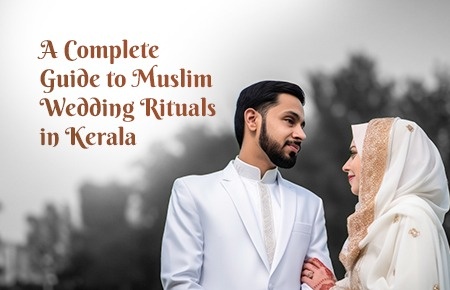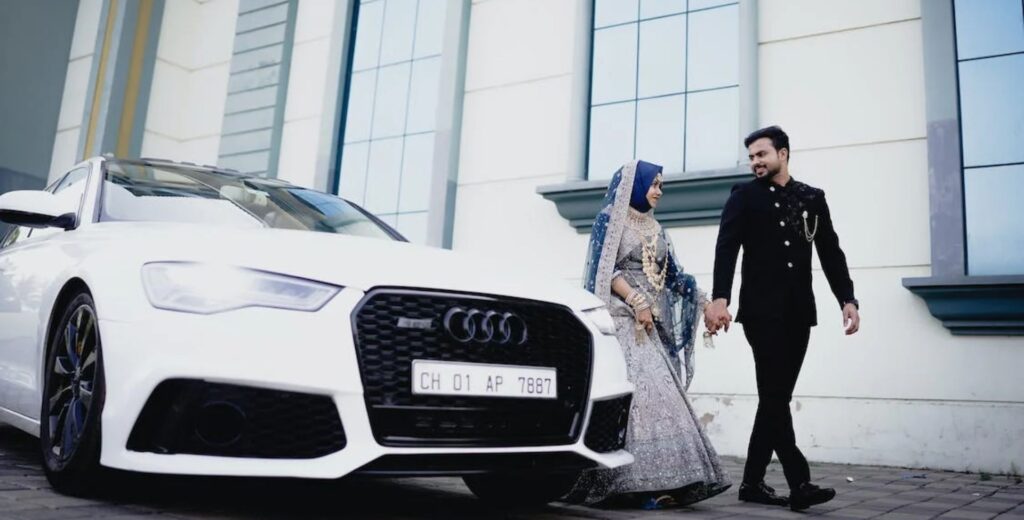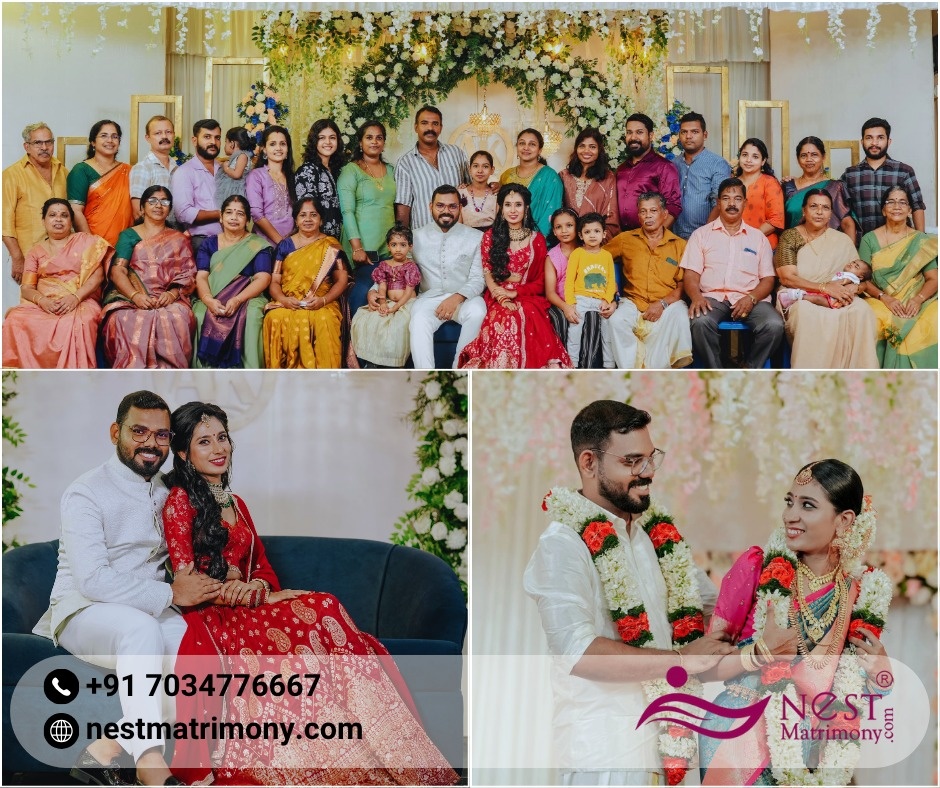A Complete Guide to Muslim Wedding Rituals in Kerala
Posted on 15 December
Wedding days are extra special in every religion. Couples and their families coming together through a wedding is also the time to honour a religion, heritage or culture that holds a deep meaning to the families of both the bride and the groom. Weddings in every location and religion would have some differences from one another.
Being the second largest religion in the world, Islam, it's no surprise that Muslim matrimonial celebrations are filled with rituals and beautiful heritage passed down through generations. Whether you are planning your wedding or attending a Muslim wedding, you should understand the Muslim wedding rituals. Here is a small list of all the Muslim wedding rituals you can see today.
Muslim Pre-Wedding Rituals

Muslim wedding celebrations are vibrant, filled with traditions and rituals that mark the journey of two individuals coming together in marriage. These rituals hold deep spiritual significance and serve as a beautiful expression of joy and blessing. Here are some of the key pre-wedding rituals observed in Muslim weddings:
- Istikhara
This Muslim pre-wedding ritual involves the recitation of a super prayer called “Salat Al Istikhara,” seeking guidance from Allah for a blessed union. It is a way for individuals and their families to seek the approval and blessings of Allah for the Muslim marriage.
- Imam
The Imam ritual of the Muslim wedding is like the Shagun rite in Hinduism. It is being performed to protect the bride and groom from all types of evil eyes and negative forces. The bride and her family are first visited by the groom's mother and other family members, who bring gifts for the bride and her family. Gifting the bride with a silver or gold coin wrapped in fine silk is the most important part of the ceremony.
- Valayidal or Engagement
This ceremony is part of a typical Kerala Muslim wedding ritual where the groom's family visits the bride's family and gifts a bangle to the bride. Valayidal is led by the groom’s mother, who adorns her future daughter-in-law with gold bangles. Family members and relatives accompanying the groom’s mother may present the bride with other ornaments.
- Mehandi Ritual
Like any wedding, mailanchi raavu is common in Muslim wedding rituals too. This function takes place 2 or 3 days before the wedding ceremony at the bride's home. It is filled with music, dance and henna applications. Henna, a natural dye, is applied to the hands and feet of the bride and other female guests.
The intricate designs and patterns symbolise love, beauty and good luck for the bride. Once the mehendi is applied, the bride is prohibited from leaving the house until her wedding day.
Muslim Wedding Day Rituals:
- Baraat or Arrival of the Groom
The Muslim groom arrives at the wedding venue accompanied by his family and friends, who sing traditional songs and dance to celebrate the occasion. The groom's family is welcomed by the bride's family with lavish possessions of dhol beats, dancing and music.
- Nikaah or the Main Muslim Wedding Ceremony
In Kerala Nikaah, both the bride and groom will be seated separately and the ceremony will be presided over by the Qazi, who is the head priest. The Qazi recites verses from the Quran and towards the end, the bride will be offered to the groom by the bride's father.
The head priest then passes the groom's proposal to the bride. This is known as Lijaab and the bride accepts the groom's proposal by saying Qubool. The Lijaab Qubool binds the bride and groom together in holy matrimony.
- Mahr Ceremony
The Mahr is a mandatory payment made by the groom to the bride as a sign of his commitment and respect for her. The amount is agreed upon by both families before the wedding and can be in the form of money, gold, or other valuables. This Muslim wedding ritual is a symbol of love, respect and courtesy towards women.
Also Read: Hindu Wedding Rituals : A Step-by-Step Guide
Muslim Post Wedding Rituals:
The post-wedding rituals in Muslim tradition hold great significance as they mark the official transition of the bride into her new life as part of the groom’s family. Here are some of the indispensable Muslim wedding rituals that mark this transition.
- Ruksat
Ruksat is the emotional ceremony of the bride saying goodbye to her family, where many tears are shed and warm embraces are shared. The father of the bride symbolically hands her over to the groom, entrusting him with her care and well-being. This is an act in which the bride accepts her new role as wife and daughter-in-law.
- Welcoming the Bride
It is the ceremony in which the bride is welcomed with warmth and joy by her mother-in-law. The mother-in-law holds the Holy Quran above the bride's head as she enters the house, which symbolises that blessings and guidance will be there with the bride throughout her married life.
This gesture also signifies the acceptance of the bride into her new family and her new role as a wife and daughter-in-law. In some traditions, the bride may be presented with gifts and sweets that further solidify the groom’s family’s acceptance of the bride and her belonging to the new family.
- Chauthi
Chauthi, also known as Basara Raati, which translates to “fourth night,” is a ceremony that is performed on the fourth day of the wedding. It is a Muslim wedding ritual that signifies the bride's first visit to her family's home after the wedding.
It is a time for the bride to reconnect with her family and for the groom, it is an opportunity to strengthen the bond with his in-laws. A grand feast will be prepared by the bride's family to symbolise the joy and celebration of the union. The family’s blessings and prayers are showered upon the couple for a happy and prosperous life together.
- Walima
Walima, also known as Dawat e Walima, means "feast.” It is a grand wedding reception hosted by the groom's family. This ceremony serves as a formal introduction of the newlywed couple to the groom's extended family and friends. It also allows the community to celebrate the Muslim marriage and offer their blessings to the couple. In this ceremony, the bride and groom will be dressed in their wedding finery and seated at the centre of the event.
Also Read: Questions to Ask Before an Arranged Marriage
Find Your Perfect Muslim Match for a Lifetime from Nest Matrimony
Now you know that, like every religion, Muslims also uphold a great number of rituals for the wedding. Throughout this blog, we have come to know the most important wedding rituals in Islam. Each muslim wedding ritual symbolises an important gesture and has a great story behind it. All these wedding rituals will give the couple a strong sense of bonding, which adds strength to their married life.
So are you ready to start on the journey of a lifetime? Then find your soulmate with Muslim Matrimony service from Nest Matrimony, one of the best free matrimony sites where you can find the one you are looking for. Our advanced and traditional tools will help you find the love and companionship you want in life. Sign up today, create your profile and find the love of your life with Nest Matrimony. Register Free to Find Your Partner





